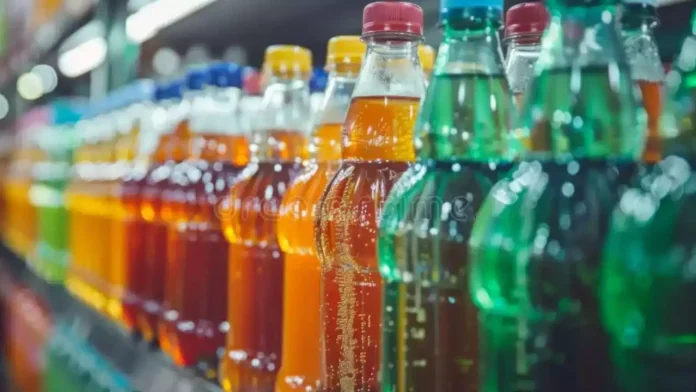The Indian Beverage Association has called for a rationalisation of the GST structure on non-alcoholic beverages, advocating for taxes to be levied based on sugar content. They͏͏ stated͏͏ that͏͏ with͏͏ supportive͏͏ policies,͏͏ the͏͏ sector͏͏ could͏͏ expand͏͏ to͏͏ INR͏͏ 1.5͏͏ lakh͏͏ crore͏͏ by͏͏ 2030.͏͏ Speaking͏͏ at͏͏ the͏͏ launch͏͏ of͏͏ an͏͏ ICRIER͏͏ report͏͏ on͏͏ tax͏͏ policy͏͏ for͏͏ carbonated͏͏ beverages͏͏ in͏͏ India,͏͏ Indian͏͏ Beverage͏͏ Association͏͏ Secretary͏͏ General͏͏ J.P.͏͏ Meena͏͏ emphasised͏͏ that͏͏ non-alcoholic͏͏ beverages͏͏ are͏͏ vital͏͏ to͏͏ India’s͏͏ food͏͏ processing͏͏ sector͏͏ and͏͏ can͏͏ significantly͏͏ contribute͏͏ to͏͏ establishing͏͏ the͏͏ country͏͏ as͏͏ a͏͏ global͏͏ manufacturing͏͏ hub.
He͏͏ also͏͏ stated͏͏ that͏͏ bottled͏͏ water͏͏ should͏͏ be͏͏ taxed͏͏ at͏͏ a͏͏ uniform͏͏ rate͏͏ of͏͏ 5%͏͏ GST͏͏ across͏͏ all͏͏ bottle͏͏ sizes,͏͏ rather͏͏ than͏͏ applying͏͏ different͏͏ rates͏͏ of͏͏ 12%͏͏ for͏͏ bottles͏͏ of͏͏ 20͏͏ litres͏͏ and͏͏ above͏͏ and͏͏ 18%͏͏ for͏͏ those͏͏ below͏͏ 20͏͏ litres.͏͏ This͏͏ change͏͏ is͏͏ essential͏͏ to͏͏ encourage͏͏ greater͏͏ private͏͏ participation͏͏ in͏͏ the͏͏ supply͏͏ of͏͏ potable͏͏ water͏͏ in͏͏ the͏͏ country.
Continue͏͏ Exploring:͏͏ Indian Beverage Association urges͏͏ government͏͏ to͏͏ exclude͏͏ carbonated͏͏ beverages͏͏ and͏͏ juice-based͏͏ drinks͏͏ from͏͏ ‘sin͏͏ taxes’
Projected͏͏ Growth͏͏ of͏͏ the͏͏ Sector:
“This͏͏ sector͏͏ (non-alcoholic͏͏ beverages)͏͏ is͏͏ currently͏͏ estimated͏͏ to͏͏ be͏͏ around͏͏ INR͏͏ 60,000͏͏ crore͏͏ and,͏͏ with͏͏ a͏͏ supportive͏͏ policy͏͏ environment,͏͏ is͏͏ projected͏͏ to͏͏ reach͏͏ approximately͏͏ INR͏͏ 1.5͏͏ lakh͏͏ crore͏͏ by͏͏ 2030,”͏͏ Meena͏͏ stated.
He͏͏ further͏͏ mentioned͏͏ that͏͏ the͏͏ sector͏͏ currently͏͏ encounters͏͏ “impediments”͏͏ due͏͏ to͏͏ “the͏͏ existing͏͏ tax͏͏ regime.”
“I͏͏ believe͏͏ the͏͏ tax͏͏ treatment͏͏ has͏͏ been͏͏ unfair͏͏ to͏͏ the͏͏ sector,͏͏ and͏͏ if͏͏ it͏͏ is͏͏ rationalised,͏͏ I͏͏ see͏͏ a͏͏ promising͏͏ future͏͏ for͏͏ India͏͏ as͏͏ a͏͏ beverage͏͏ processing͏͏ hub͏͏ in͏͏ the͏͏ near͏͏ future,”͏͏ he͏͏ added.
Meena͏͏ stated͏͏ that͏͏ when͏͏ the͏͏ GST͏͏ regime͏͏ was͏͏ introduced,͏͏ non-alcoholic͏͏ beverages͏͏ were͏͏ classified͏͏ as͏͏ “demerit͏͏ goods͏͏ or͏͏ sin͏͏ products,”͏͏ grouping͏͏ them͏͏ with͏͏ items͏͏ like͏͏ tobacco͏͏ and͏͏ alcohol.͏͏ Most͏͏ of͏͏ these͏͏ products͏͏ were͏͏ taxed͏͏ at͏͏ “the͏͏ highest͏͏ GST͏͏ level͏͏ of͏͏ 28%͏͏ plus͏͏ an͏͏ additional͏͏ 12%͏͏ cess.”
Global͏͏ Consensus͏͏ on͏͏ Sugar-Based͏͏ Taxation:
He͏͏ stated͏͏ that͏͏ non-alcoholic͏͏ beverages͏͏ should͏͏ be͏͏ taxed͏͏ based͏͏ on͏͏ their͏͏ sugar͏͏ content,͏͏ with͏͏ products͏͏ containing͏͏ the͏͏ highest͏͏ sugar͏͏ levels͏͏ subjected͏͏ to͏͏ the͏͏ highest͏͏ GST͏͏ and͏͏ those͏͏ with͏͏ minimal͏͏ sugar͏͏ attracting͏͏ the͏͏ lowest͏͏ rate.
The͏͏ ICRIER͏͏ report͏͏ noted͏͏ that͏͏ there͏͏ is͏͏ a͏͏ global͏͏ consensus͏͏ among͏͏ policymakers͏͏ on͏͏ the͏͏ necessity͏͏ of͏͏ implementing͏͏ a͏͏ sugar-based͏͏ or͏͏ layered͏͏ tax͏͏ on͏͏ carbonated͏͏ soft͏͏ drinks͏͏ (CSDs).
Indian͏͏ consumers͏͏ are͏͏ becoming͏͏ more͏͏ health-conscious͏͏ and͏͏ are͏͏ open͏͏ to͏͏ trying͏͏ new͏͏ products,͏͏ such͏͏ as͏͏ low͏͏ or͏͏ no-sugar͏͏ carbonated͏͏ beverages͏͏ and͏͏ fruit-based͏͏ carbonated͏͏ drinks.
“Hence,͏͏ there͏͏ are͏͏ opportunities͏͏ for͏͏ the͏͏ country͏͏ to͏͏ expand͏͏ the͏͏ production͏͏ of͏͏ various͏͏ CSDs,͏͏ including͏͏ low-sugar͏͏ options,͏͏ which͏͏ can͏͏ boost͏͏ sector͏͏ revenue,͏͏ attract͏͏ investment͏͏ in͏͏ manufacturing,͏͏ and͏͏ create͏͏ jobs.͏͏ A͏͏ layered-tax͏͏ model͏͏ based͏͏ on͏͏ added͏͏ sugar͏͏ content͏͏ in͏͏ CSDs͏͏ can,͏͏ therefore,͏͏ drive͏͏ growth,”͏͏ the͏͏ report͏͏ stated.
Highlighting͏͏ the͏͏ urgent͏͏ need͏͏ for͏͏ a͏͏ layered͏͏ tax͏͏ on͏͏ CSDs͏͏ based͏͏ on͏͏ sugar͏͏ content,͏͏ the͏͏ ICRIER͏͏ report͏͏ stated,͏͏ “This͏͏ tax͏͏ structure͏͏ is͏͏ necessary͏͏ to͏͏ distinguish͏͏ healthier͏͏ products͏͏ from͏͏ less͏͏ healthy͏͏ ones,͏͏ promote͏͏ the͏͏ production͏͏ and͏͏ sale͏͏ of͏͏ healthier͏͏ alternatives,͏͏ and͏͏ encourage͏͏ consumers͏͏ to͏͏ choose͏͏ low͏͏ and͏͏ no-sugar͏͏ beverages.”
The͏͏ report͏͏ added͏͏ that͏͏ a͏͏ lower͏͏ tax͏͏ on͏͏ healthier͏͏ products͏͏ could͏͏ reduce͏͏ prices,͏͏ leading͏͏ to͏͏ increased͏͏ consumption,͏͏ while͏͏ also͏͏ encouraging͏͏ producers͏͏ to͏͏ shift͏͏ towards͏͏ healthier͏͏ options.





